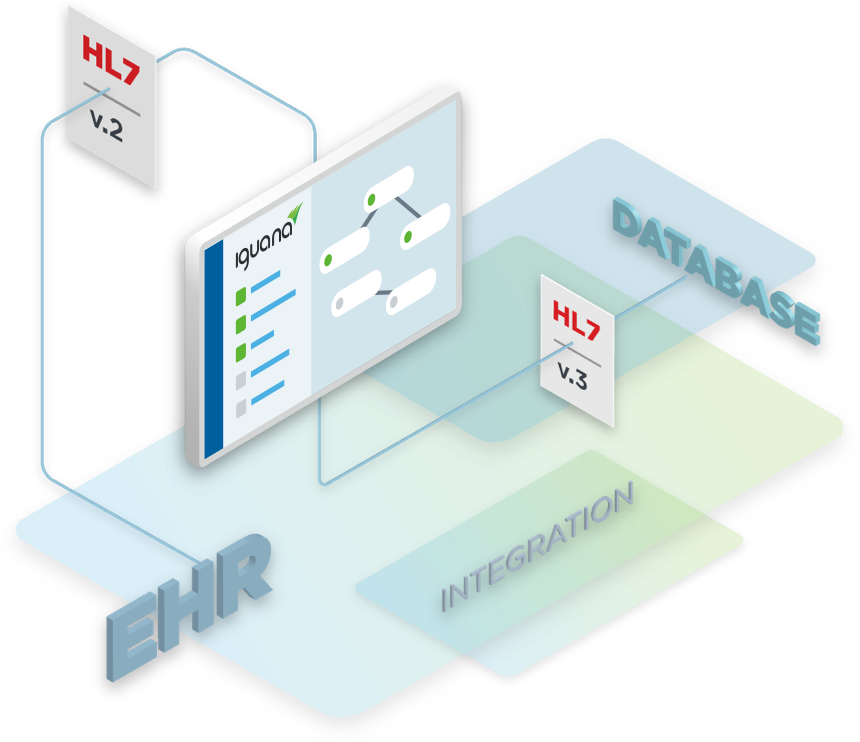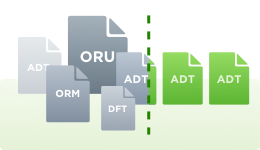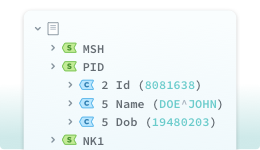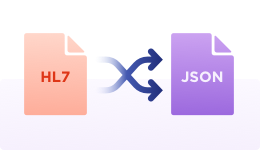THE IGUANA INTERFACE ENGINE
What Is An HL7 Interface Engine?
An HL7 interface engine is a central hub that receives, routes, and sends HL7 messages to the appropriate healthcare information systems. A modern interface engine:
- Simplifies integration by connecting healthcare systems
- Supports all HL7 versions: HL7 v2.x, v3.x, and more
- Ensures HL7 messages are communicated in a fast, reliable, and secure manner

HL7 Interface Engine Features
Why Choose the Iguana HL7 Interface Engine?
At iNTERFACEWARE, we understand the importance of efficient and effective communication in healthcare. That's why we have developed the Iguana HL7 Interface Engine that simplifies the integration process and ensures seamless communication between systems.
Our HL7 Interface Engine supports all major HL7 versions, including HL7 2.x and FHIR, and can easily handle large volumes of message processing.
Simplified Integration Process
The Iguana HL7 Interface Engine offers a user-friendly interface that enables you to configure and manage interfaces quickly and easily, reducing integration time and costs.
HL7 Version Support
Iguana supports all major HL7 versions, including HL7 2.x and FHIR, and can handle a wide range of healthcare data formats, such as ADT, ORM, ORU, and more.
HL7 Message Processing
The Iguana HL7 Interface Engine supports both real-time and batch processing, making it ideal for a variety of use cases, from supporting critical patient care workflows to processing large volumes of data for analytics.
HL7 Data Customization
Iguana can not only filter for the specific HL7 messages you want, but the message formatting can be completely customized to adhere to different system requirements, or even transformed to other data formats such as CDA, CCD, X12, JSON, EDI and more.
Security and Reliability
The Iguana HL7 Interface Engine uses industry-standard encryption and authentication protocols to record user activity and log sensitive healthcare data securely.
24/7 Customer Support
Iguana's team of experts provides exceptional customer support 24/7, ensuring that your healthcare organization's communication needs are always met.
Get Started with Iguana
HL7 MESSAGE HANDLING
Common HL7 Interface Engine Requirements
FILTER HL7 MESSAGES
With the Iguana HL7 Interface Engine, you can filter HL7 messages based on specific criteria, such as message type, patient ID, or location, ensuring that only relevant data is processed and transmitted.

PARSE HL7 MESSAGES
Iguana enables you to parse HL7 messages into an expandable tree-view format that is easy to read, allowing you to extract specific data elements, such as patient demographics, clinical orders, or lab results, for further processing or analysis.

TRANSFORM HL7 MESSAGES
Using Iguana, HL7 messages can be transformed to accommodate different HL7 versions, custom proprietary formats of HL7 messages or to other industry standard healthcare data formats that need to be processed by your health information system.

HL7 Integration You Can Trust
(4.8)
"Iguana is very flexible and efficient for implementing HL7 interfaces and complex scripting tasks."
End-to-End System Compatibility - Guaranteed
-
-
-
-
-
-
-
-
-
-
- ß
-
-
-
-
-
Send Any Data Format
- HL7 v2
- HL7 v3
- FHIR
- CDA
- CCD
- X12
- NCPDP
- EDI
- XML
- JSON
- Delimited Text
- ...and more
To/From Any System
- EHRs (Epic, Cerner, Allscripts, AthenaHealth, and more...)
- Information Systems (HIS, LIS, RIS, BIS, PACS, HIE, and more...)
- Devices (Medical Devices, Mobile Apps, Wearbles, etc.)
- Databases (DB2, File Maker Pro, MS Access, MS SQL Server, MySQL, Oracle, etc.)
Via Any Transport Protocol
- LLP
- TCP / IP
- HTTP / HTTPS
- FTP / SFTP / FTPS
- Database (OCI / ODBC)
- Web Services (SOAP, RESTful)
- File System
- ...and more

Iguana is designed to work with any HL7 message requirements:
Talk to an HL7 Integration Expert
FAQs: Iguana & HL7
Does iNTERFACEWARE provide managed HL7 integration services?
No, iNTERFACEWARE does not provide a managed integration service. We offer Iguana, an HL7 interface engine that puts your team in full control. You develop, deploy, and maintain your integrations internally, using Iguana's platform and tools. This model gives you long-term flexibility, eliminates vendor lock-in, and ensures that integration capabilities grow alongside your organization's needs.
Who typically uses Iguana for HL7 integration?
Iguana is designed for teams that want to build and manage their own integrations — typically healthcare software vendors, hospital IT departments, and developers.
To use Iguana effectively, you’ll need access to a developer or technical team. It’s a code-based platform, so programming is required. If you’re new to HL7, we offer coding templates and tools can help you get started. But if you don’t have technical resources in-house or through a partner, Iguana likely won’t be the right fit.
How does Iguana compare to low-code or plug-and-play HL7 integration tools?
Iguana is built for complex, mission-critical healthcare environments where low-code tools often fall short. While drag-and-drop platforms might work for simple interfaces, they typically lack the flexibility required for custom message handling, version discrepancies, and multi-system orchestration. Iguana is a developer-focused HL7 integration tool that enables precise, maintainable integrations that perform reliably under real-world conditions.
Will I need to write code to work with HL7 data in Iguana?
Yes, Iguana is a code-based HL7 integration engine designed for developers who want full control over their interfaces. While coding is required, the development environment is built for productivity. Iguana’s Translator includes real-time debugging, message output previews, and intelligent autocomplete, which significantly accelerates scripting and minimizes trial-and-error. Most integrations are developed faster than from-scratch builds, and many customers leverage our pre-built modules to avoid rework.
If Iguana is code-based, will I be on my own when building interfaces?
Not at all. While Iguana empowers you to build fully custom integrations in code, you’re supported every step of the way. We provide pre-built templates, shared code libraries, and intelligent development tools like autocompletion and real-time output previews. Best of all, our highly responsive support team is available whenever you need guidance — offering the kind of expert, hands-on help that sets iNTERFACEWARE apart.
Do you offer out-of-the-box HL7 integration with common EHRs like Epic, etc.?
Not exactly. Some platforms advertise "pre-built" EHR adapters, but these rarely work as-is due to differences in each implementation.
Iguana takes a different approach. It gives you the tools to develop the exact interfaces you need — customized to your specific setup.
However, to speed things up, Iguana comes with a core collection of pre-built templates and starter components for systems including Epic and Athenahealth. These give your team a head start when building HL7 interfaces tailored to your environment.
What HL7 message types and versions does Iguana support?
Iguana supports all versions of the HL7 standard, including HL7 v2.x, HL7 v3, and CDA/CCD documents. Whether you're working with ADT, ORU, ORM, SIU, or any other message type, Iguana gives you complete control over how these messages are parsed, filtered, transformed, and routed. It is a robust HL7 integration engine built to adapt to any schema or implementation variation.
Can Iguana parse HL7 messages and extract specific segments or fields?
Yes. Iguana includes a built-in HL7 parser that not only gives you full programmatic access to message segments, fields, and components, but also displays them in a structured, human-readable node tree view. This makes it easy to explore message contents visually — especially helpful during development and debugging. Whether you're working with standard segments like PID, OBX, and MSH, or custom Z-segments, you can quickly identify and extract exactly the data you need without decoding raw HL7 text by hand.
Can Iguana map HL7 fields between different versions or systems?
Yes. Iguana is built to handle the real-world mapping challenges that come with HL7 integration. Whether you're dealing with mismatched schemas, vendor-specific formats, or inconsistent field usage, Iguana gives you full control to remap fields, convert values, restructure messages, and apply logic as needed.
To help accelerate development, Iguana also includes pre-built components like "HL7 Map" and "HL7 to HL7 Map", which simplify the process of normalizing and transforming HL7 messages between systems. These reusable modules make it easy to handle field-level translation without having to start from scratch.
Can Iguana translate HL7 messages to (or from) other data formats?
Yes. Iguana is a format-agnostic HL7 integration platform designed to transform data between a wide range of healthcare standards. You can convert HL7 messages into formats like FHIR, JSON, XML, X12, EDI, or even custom flat files — and do the reverse just as easily. This flexibility makes Iguana an ideal solution for bridging legacy systems with modern healthcare APIs and supporting both clinical and administrative interoperability strategies.
Does Iguana support LLP for HL7 data transport?
Yes, Iguana fully supports the Lower Layer Protocol (LLP), which is a common method for transmitting HL7 messages over TCP/IP. Whether you need to send or receive HL7 v2 messages using LLP, Iguana provides built-in support for connection management, message parsing/transformation/mapping, acknowledgment handling, and error logging, making it a highly reliable HL7 integration tool for real-time clinical data exchange.
Does Iguana include tools for testing HL7 messages before going live?
Yes. Iguana includes a built-in HL7 Simulator that lets you send test messages through your interfaces to validate behavior, troubleshoot issues, or simulate real-world data flows. You can craft and send HL7 messages of any type, modify field values on the fly, and watch how your logic responds — all without needing a live connection to a production system. It’s an essential tool for safe, efficient HL7 interface development and QA.
Can Iguana scale to support multiple HL7 interfaces across different environments?
Absolutely. Iguana is used by hospitals, labs, and healthcare vendors to run hundreds or even thousands of HL7 interfaces across geographically distributed environments. Its scalable architecture and centralized dashboard make it easy to monitor interface health, log message activity, and respond quickly to issues. Whether you're supporting a multi-tenant deployment or need a high-availability configuration, Iguana is a reliable HL7 interface engine for enterprise-grade scale.
What systems can Iguana connect to using HL7 data?
Iguana can connect to virtually any system that sends or receives healthcare data. It works seamlessly with EHRs, LIS, RIS, PACS, CRMs, billing platforms, cloud apps, APIs, medical devices, and more. It supports all major communication protocols, including LLP, TCP/IP, FTP, SFTP, HTTP, HTTPS, SOAP, REST, file systems, and direct database connections. Whether you're exchanging HL7 data internally or across external systems, Iguana gives you the integration capabilities to do it securely and reliably.
What kind of support can I expect from iNTERFACEWARE?
You can expect responsive and knowledgeable support from a team that understands integration. We provide email and phone support, detailed documentation, and training resources to help your team succeed. For more hands-on help, our professional services team is available to assist with specific projects or ongoing needs.
Whether you're exchanging data through APIs, working with HL7, FHIR, or other formats and protocols, we're here to help guide you through the process. Many of our customers cite the quality of our support as one of the main reasons they chose Iguana.